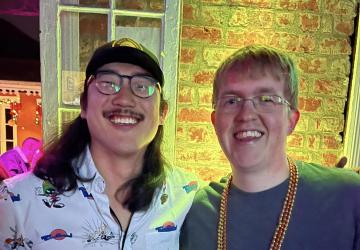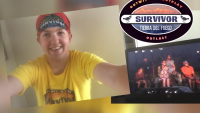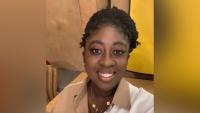
The advice I needed, in more ways than one
James Hayden, our contributor from the U.S., talks about learning to look back at how he handled stammering with more kindness.
"Remember that you played the best you could with what you knew at the time."
(Owen Knight)
The above advice was given to me back in March by Owen Knight, who was a finalist on season 43 of the show Survivor (U.S. version). If you've read some of my previous articles you'll know I'm a big fan of the reality show where people compete in a complex social strategy game on an island. I even took part in a fan-made Survivor game in June 2022. Personally, I was more than fulfilled by and at peace with the experience. However, I didn't win and the Survivor player in me was still struggling mightily with regrets and what ifs.
I mentioned this to Owen when I got a chance to speak with him at a Survivor watch party in March (see the picture above). His advice was what I needed, in more ways than one. By looking at things with that mindset I gained closure from how my game played out. I thought about what he said when I found myself once again going down the 'what if?' rabbit hole with my speech.
Past stuttering moments
In July, I attended the National Stuttering Association's (NSA) annual conference in Fort Lauderdale, Florida. While driving to lunch with my friends, Danny and Carl, we got onto the topic of "How do you deal with not being hard on yourself for how you handled your stutter in the past?". While discussing this, Owen's advice about popped into my mind. In that moment, I realised that it could be applied to stuttering. And no, I'm not comparing stuttering to some silly game. Rather, the importance of realising we did the best we could with the knowledge we had and who we were at the time.
For the first 22 years of my life I didn't handle my stuttering moments in the best way. And that's putting it nicely.
For the first 22 years of my life I didn't handle my stuttering moments in the best way. And that's putting it nicely. I would beat myself up over not saying something fluently. My mindset was, 'If I can say this without stuttering in the therapy room, then why can't I say this without stuttering outside of it?'. In addition to equating success to fluency, I passed on opportunities or played dumb. I can't even begin to count the times I chose not to participate in a class discussion, jump in on a conversation or approach that cute girl because being silent was better than stuttering. While in college, pretending I didn't know the name of my apartment complex, Hillendale, was better than stuttering on the 'H' in Hillendale.
When I was in my mid-20s, I would look back at those missed opportunities with anger. What could've been if I had the mindset of, 'Fluency be damned'. I resented my younger self for not having the more positive mindset that I had at the time. Now at 30, I look back at how the 20-year-old me handled his stuttering moments and extend him grace and forgiveness. Owen's words best describe the foundation of that grace and forgiveness. I was doing the best I could with the tools I had at the time and where I was on my journey, both as a person and with stuttering. I didn't know how to advocate for myself. I wasn't comfortable with admitting "I stutter" to myself much less to others. I equated success with fluency and any other result was a failure. And looking back, how I handled those numerous stuttering moments is valid because that's who I was and where I was on my journey.
Handling things differently
Now at 30, I look back at how the 20-year-old me handled his stuttering moments and extend him grace and forgiveness.
I handle my stuttering moments differently now. I allow them to happen, to exist in that moment, and then continue the conversation. I don't harp on about what I wish I did or didn't do in terms of technique or fluency. There are moments when I choose to not handle them gracefully, but that's still valid. I'm doing my best in that moment, and my best looks different in every moment. That's something I didn't, nor wouldn't, acknowledge as a 20-year-old. Back then my best was fluency, and everything else was a failure.
I hope I still hold on to this mindset and advice when I'm 40. I hope that my future self looks back upon my current self with grace and understanding.
Looking back with knowledge and hindsight, I have mixed feelings toward my time in speech therapy. Anger is not one of them though. I realise that everyone involved was doing the best they could with what they knew at the time. The approach, although outdated now, was and is still valid because that was the best in the late 1990s and early 2000s.
Through Owen's advice and the personal growth I've experienced over the past year and a half, I've realised that knowing you did your best is the foundation from which we give ourselves grace. Our best in 2013 might not look like our best in 2023. And our best in 2023 might not look like our best in 2033. However, it was the best because of who we were, what we knew, and where we were on our journeys at the time. We did what we could with what we knew at the time. And sometimes we have different definitions of what 'our best' looks like. Yet, through it all our best was, is, and always will be enough.
Read more articles from James. Would you like to write something? Tell us about your stammering-related experiences or opinions. See Submit Something For The Site.

































